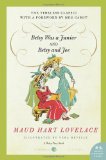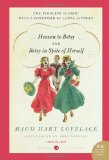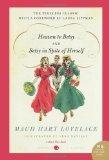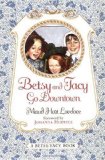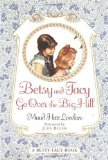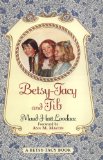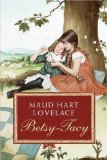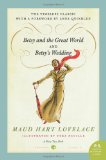 This book went straight over my head when I was young. Oh I was a good reader and a smart kid, but whoa. Although honestly, who wouldn’t be thrown for a loop? We leave Betsy right after her graduation. We have certain ideas about what is going to happen in her future. Then rather unceremoniously Lovelace throws us into a totally different world. Betsy’s 21 (21! Where did the last four years go!), boarding a ship to Europe. Alone. Within minutes she’s receiving flowers from someone named Bob. BOB. I ask you – Do we know any Bob? It’s hard to take all that in without a bit of explanation, even for a devout Betsy reader. The next chapter clarifies a lot, but the first chapter certainly sets the stage. This is not a Deep Valley book. Our beloved characters are mentioned throughout but Betsy is the only one really in this story.
This book went straight over my head when I was young. Oh I was a good reader and a smart kid, but whoa. Although honestly, who wouldn’t be thrown for a loop? We leave Betsy right after her graduation. We have certain ideas about what is going to happen in her future. Then rather unceremoniously Lovelace throws us into a totally different world. Betsy’s 21 (21! Where did the last four years go!), boarding a ship to Europe. Alone. Within minutes she’s receiving flowers from someone named Bob. BOB. I ask you – Do we know any Bob? It’s hard to take all that in without a bit of explanation, even for a devout Betsy reader. The next chapter clarifies a lot, but the first chapter certainly sets the stage. This is not a Deep Valley book. Our beloved characters are mentioned throughout but Betsy is the only one really in this story.
Her travels have their interesting moments; my favorite parts are her time in London and in Munich. She learns so much in Munich about the how the Europeans view social classes and there’s also the foreshadowing of war, with soldiers all about. The time in London again piqued my interest because it is the lead up to World War I (including the actual, literal, eve of war). But the romance in Venice? Meh.
This is much harder to understand than its predecessor and for that reason I’m recommending it for teens rather than middle grades and tweens. While all the high school books are heavy on Western Canon type knowledge this one really expects a working understanding of SO MUCH STUFF. There are things tossed off in this book (sympathizing with the Boers, suffrage, Pinakothek, Passion Plays in Oberammergau) that you could spend entire courses discussing and analyzing. It can be really overwhelming to a knowledgeable well-read, well-traveled adult, so I’m guessing for younger readers it just wouldn’t be worth it.
Women’s lib is failing girls!: Oh sure, Betsy still wants to be an author, and yes, she’s a suffragist. BUT. She also is a college dropout (and AGAIN this happens because she puts socializing ahead of her studies). And, much ookier, at one point she’s fantasizing about an older man and how if she marries him she’ll hang on his every word. You know, because he’ll be so much older. And manly.
Great for: Getting a sense of Europe in the days before World War I. Growing up, I heard tons of stories about WWII, but WWI? I didn’t know so much other than than a) BAD Germans and b) some Archduke was shot. It’s fascinating to follow Betsy’s time in Munich (filled with soldiers, always soldiers), Italy (the monarchy on the brink of failure) and London (quite literally on the eve of war). The parts foreshadowing the fall of Europe and detailing the mood in London are really the most interesting parts of the book. So um, that’s a little change in tone from the prior books, eh?
Sex, Nudity, Dating – Many of Betsy’s friends of yore are married. Bit of hand kissing, hand holding, regular kissing and another proposal. A drawing of Betsy in the tub, strategically covered for modesty, but the undercurve of a breast is seen.
Profanity – “Pooh”, “the deuce” darn, “ass” once in a religious context used for a donkey.
Death, Violence and Gore – Tacy’s father dies. There’s a reference to someone having seen President Lincoln in his coffin. Trip to the Tower of London means thoughts of murdered princes and beheadings.
Drugs, Alcohol and Smoking – Still Mr Ray smokes cigars. Some men smoke cigarettes. Some women smoke. There are shipboard toasts with a punch that involves alcohol. There’s an implication that one girl’s father is an alcoholic. Betsy is asked out for a beer.
Frightening or Intense Things – Betsy has appendicitis.

